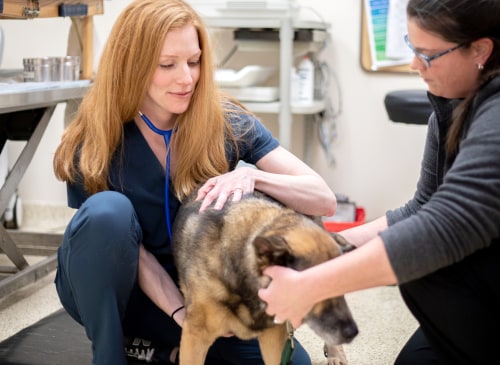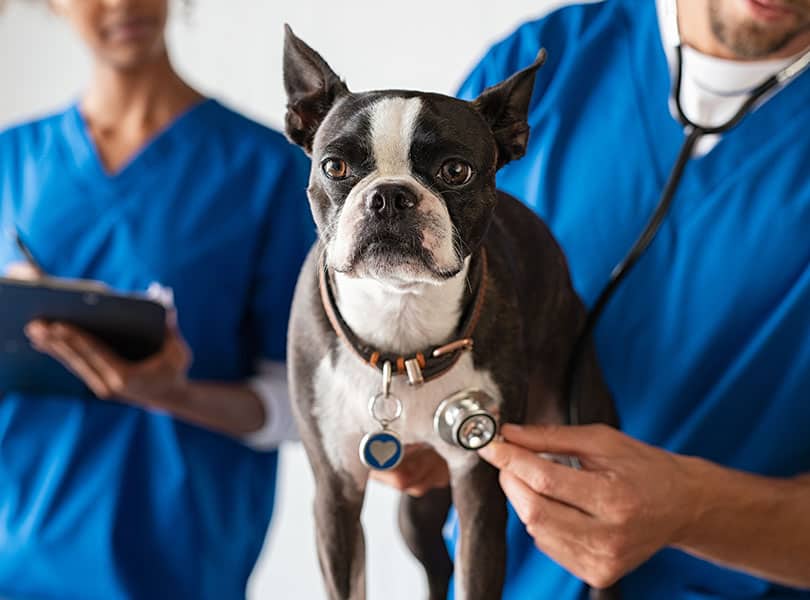Exploring the Important Solutions Provided by a Veterinary Cardiologist: Understanding Ultrasound and CT Check Strategies
Veterinary cardiologists play an important role in the wellness of family pets by identifying and treating numerous heart disease. They use advanced imaging strategies, such as cardiac ultrasound and CT scans, to provide exact examinations. Each technique has its distinct benefits and applications. Understanding these techniques is crucial for family pet owners looking for the very best care for their companions. What elements should family pet owners think about when choosing between these diagnostic tools?

The Role of Veterinary Cardiologists in Family Pet Medical Care
Veterinary cardiologists play an essential function in the medical care of pets, focusing especially on diagnosing and treating heart-related conditions. They possess specialized training that enables them to translate complicated diagnostic tests and identify various cardiovascular issues. These professionals make use of innovative strategies, such as echocardiography and electrocardiography, to assess heart feature and framework accurately.Veterinary cardiologists additionally create customized treatment plans that may consist of drugs, way of life adjustments, and, sometimes, surgical interventions. Their proficiency expands to enlightening animal owners regarding heart health, emphasizing the importance of routine check-ups and early detection of possible problems. Partnership with basic vets is important, as it assures detailed look after pet dogs with suspected cardiac concerns. By supplying specialized services, vet cardiologists substantially improve the lifestyle for animals and give satisfaction for their proprietors, strengthening the value of heart health in overall pet dog wellness.
Common Heart Concerns in Animals
Common cardiac issues in pet dogs can considerably influence their health and lifestyle. Heart murmurs, numerous types of cardiomyopathy, and hereditary heart issues are among the most widespread problems that vets experience. Board Certified Veterinary Cardiologist. Recognizing these problems is vital for family pet proprietors to ensure prompt diagnosis and appropriate therapy
Heart Murmurs in Pets
Heart whisperings can be a source of worry for animal proprietors, they are not always a measure of major health and wellness issues. A heart murmur is an unusual noise generated by rough blood circulation within the heart. In pet dogs, these murmurs can be triggered by numerous aspects, including genetic heart defects, shutoff concerns, or perhaps stress and anxiety during examinations. Many animals with heart murmurs lead regular lives without substantial health influences. To identify the underlying reason, vet cardiologists often employ diagnostic techniques such as echocardiograms and Doppler ultrasounds. Early discovery and assessment are crucial, as they might aid take care of any kind of prospective cardiac problems efficiently. Pet dog proprietors are encouraged to consult their veterinarian for a complete evaluation if a heart murmur is spotted.
Cardiomyopathy Kind Explained
Cardiomyopathy incorporates a team of diseases impacting the heart muscle mass, leading to endangered cardiac function in family pets. The most usual kinds include expanded cardiomyopathy (DCM), hypertrophic cardiomyopathy (HCM), and limiting cardiomyopathy (RCM) DCM mainly influences dogs, causing the heart to increase the size of and compromise, which diminishes its capacity to pump blood successfully. In contrast, HCM is more common in felines, characterized by the enlarging of the heart wall surfaces, usually resulting in obstructed blood circulation. RCM, though much less common, happens when the heart muscular tissue comes to be rigid, limiting its capacity to full of blood. Each kind offers distinct difficulties in diagnosis and treatment, demanding specialized vet cardiological analysis to guarantee peak monitoring and look after impacted pets.
Hereditary Heart Flaws
Congenital heart problems represent a considerable category of cardiac problems in family pets, distinctive from acquired problems such as cardiomyopathy - CT Scans For Animals. These defects are structural problems existing at birth, influencing the heart's typical function. Common types consist of patent ductus arteriosus, ventricular septal problems, and pulmonic stenosis. Symptoms might differ commonly, varying from light to extreme, and can consist of exercise intolerance, coughing, and difficulty breathing. Early diagnosis with sophisticated imaging techniques like ultrasound is essential for reliable monitoring. Vet cardiologists play an important duty in determining these problems and suggesting proper treatment options, which may include medical administration or surgical treatment. Identifying congenital heart problems enables for much better end results and enhanced top quality of life for influenced animals
Comprehending Cardiac Ultrasound: How It Functions
A significant number of veterinary techniques now make use of cardiac ultrasound as a crucial analysis tool for assessing heart wellness in pets. This non-invasive method uses high-frequency sound waves to develop images of the heart's framework and feature. During the procedure, a veterinary specialist uses a gel to the pet's chest and makes use of a transducer to send out ultrasound waves. These waves bounce off the heart and surrounding structures, generating real-time pictures on a monitor.Veterinarians can analyze different elements of heart health, consisting of chamber dimension, wall surface activity, and valve feature. Furthermore, heart ultrasound enables for the discovery of abnormalities such as liquid build-up and congenital heart defects. This strategy is essential for detecting problems that may not be visible via typical radiographs. By giving in-depth information learn this here now about the heart's makeup and performance, heart ultrasound aids in formulating reliable therapy plans for pets experiencing from heart disease.
The Relevance of CT Scans in Diagnosing Heart Issues
Exactly how do CT scans boost the medical diagnosis of heart conditions in vet medicine? CT scans provide thorough cross-sectional photos of the heart and surrounding frameworks, allowing vets to imagine intricate anatomical partnerships. This imaging method is specifically valuable in determining genetic heart problems, heart lumps, and abnormalities in capillary. By making use of sophisticated imaging formulas, CT scans can analyze heart chamber sizes and feature, providing a thorough view that might be challenging to accomplish with traditional methods.Additionally, CT angiography can picture blood circulation and identify areas of constriction or blockage, which is important for preparing possible interventions. The speed and precision of CT scans likewise assist in fast medical diagnoses, vital in emergency scenarios. Inevitably, the consolidation of CT checks into veterinary cardiology significantly improves the precision of medical diagnoses, making it possible for targeted treatment strategies and boosting person outcomes for animals experiencing from heart disease.
Contrasting Ultrasound and CT Check Techniques
While both ultrasound and CT scans are indispensable devices in veterinary cardiology, they provide unique advantages and restrictions that affect their usage in identifying heart disease. Ultrasound, or echocardiography, supplies real-time imaging of the heart's framework and feature, permitting vets to examine heart chambers, shutoffs, and blood circulation. It is specifically efficient for reviewing problems like congestive heart failing and cardiomyopathy. Nonetheless, ultrasound might be restricted in picturing specific anatomical structures due to patient size or obesity.In comparison, CT checks deal in-depth cross-sectional pictures of the heart and surrounding tissues, making them perfect for identifying architectural problems, lumps, or vascular problems. CT scans supply extensive understandings, they need sedation and may entail radiation exposure. Inevitably, the option in between ultrasound and CT scans depends on the certain medical scenario, the individual's condition, and the info needed for a precise diagnosis.
Therapy Options Readily Available Through Vet Cardiology
Vet cardiology uses a variety of therapy options tailored to resolve various heart disease in animals. Treatment strategies typically start with way of living modifications, including diet regimen changes and exercise changes, aimed at enhancing total heart health. Drugs play a vital function, with cardiologists suggesting drugs such as diuretics, beta-blockers, and ACE preventions to boost and manage symptoms cardiac function.In a lot more extreme cases, interventional procedures, such as balloon valvuloplasty or stent positioning, might be necessary to minimize clogs or boost blood flow. For specific hereditary heart issues, medical options might be checked out to deal with structural issues. Furthermore, continuous tracking and follow-up treatment are crucial components of an extensive therapy strategy, permitting prompt adjustments based on the animal's reaction to treatment. On the whole, vet cardiology concentrates on giving reliable, personalized like maximize the wellness and health of pet people with heart disease.
Just how to Prepare Your Pet Dog for a Heart Analysis
Preparing a pet dog for a heart analysis is essential to guarantee exact outcomes and a smooth procedure. Owners ought to first schedule the consultation with the veterinary cardiologist and discuss any kind of specific needs or problems. It is suggested to keep food for at the very least 12 hours prior to the evaluation, as this aids boost imaging high quality during treatments like ultrasound or CT scans.Additionally, keeping a calm environment on the day of the consultation can assist decrease the pet's anxiousness. It is valuable to bring along any kind of relevant clinical documents, including previous examinations and medicines (Ultrasound For Dogs). Owners should additionally ensure that their pet is comfy and leashed during transportation to the clinic. Ultimately, familiarizing themselves with the analysis procedure can reduce fears and assist in asking notified concerns during the examination. By adhering to these steps, proprietors can contribute substantially to the efficiency of the heart evaluation
Often Asked Inquiries
For how long Does a Heart Ultrasound or CT Scan Take?
The duration of a heart ultrasound generally varies from 30 to 60 minutes, while a CT check may take roughly 15 to half an hour. Variables such as the client's problem can influence these time quotes.

Are There Any Kind Of Dangers Connected With These Analysis Treatments?

Can I Stay With My Pet During the Treatment?
The vet facility's plan commonly determines whether animal proprietors can continue to be during procedures. While some centers encourage proprietor existence for comfort, others might need separation to assure security and perfect problems for diagnostic imaging.
Just how much Do These Analysis Tests Commonly Expense?
The costs of analysis examinations, such as ultrasound and CT scans, generally differ based on area and facility. Typically, costs her latest blog vary from a few hundred to over a thousand bucks, showing the intricacy and innovation entailed.
What Is the Healing Refine After a Cardiac Analysis?
The recovery procedure after a cardiac examination involves keeping an eye on the pet for any type of immediate reactions, making sure comfort, and limiting physical task. Veterinarians commonly offer post-evaluation directions to guide animal proprietors during this vital recuperation period. Heart murmurs, different kinds of cardiomyopathy, and hereditary heart issues are among the most common problems that vets encounter. A heart murmur is an irregular sound produced by rough blood circulation within the heart. Cardiomyopathy incorporates a group of illness affecting the heart muscle mass, leading to endangered heart function in animals. Hereditary heart flaws represent a considerable group of heart issues click this site in animals, distinct from obtained problems such as cardiomyopathy. Ultrasound, or echocardiography, supplies real-time imaging of the heart's framework and feature, permitting vets to analyze heart chambers, valves, and blood flow.
Comments on “FAQs Before Visiting a Board Certified Veterinary Cardiologist}”